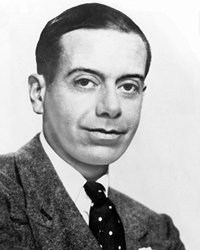A talented writer and musician, Porter took Broadway by storm with his piercing wit. “Anything Goes” and “Kiss Me, Kate” are considered classics and a number of his songs have become standards.
Cole Porter’s Early Days
Cole Porter was born on June 9, 1891, in Peru, Indiana. The grandson of a wealthy speculator, he had a comfortable childhood during which he studied piano and violin. He also became adept at music composition.
While matriculating at Yale University, he became known for the fight songs he had written for the school. After graduating in 1913, he continued his education at Harvard Law School, but he soon traded music for law. By 1916, he had left school and made his Broadway debut with the short-lived “See America First.”
Porter spent the next 20 years as a prominent figure in high society, attending all the best parties and frequently traveling to Europe. Though Porter was homosexual, he married Linda Lee Thomas, a well-to-do divorcée, in 1919. In his wife, Porter had a disguise for his sexual orientation—of which Linda was fully aware—but also a companion and ardent supporter of his theatrical projects.
Sources in this Story
- Encyclopedia Britannica: Cole Porter
- National Review: Oh, The Songs!
- The New York Times: Cole Porter Is Dead; Songwriter Was 72
- The New Yorker: King Cole
Porter’s Composing and Songwriting
Porter’s first break was “Fifty Million Frenchmen” in 1929. A few years later he wrote a number of pieces for “Gay Divorce,” which was later adapted into the film “The Gay Divorcée,” starring Fred Astaire and Ginger Rogers, in 1934.
It wasn’t until “Anything Goes” that Porter truly demonstrated the scope of his talent. The romantic farce, set on an ocean liner traveling from New York to London, catapulted Porter to showbiz prestige with standards like “You’re the Top” and “I Get a Kick Out of You.”
What separated Porter from other composers was his talent for writing lyrics. At the time, it was standard practice for a composer and lyricist to construct show tunes together. But his intuitive grasp of language afforded him rare self-reliance.
“[He] knitted the two together with such dexterity,” writes John Derbyshire in National Review, “that the whole is usually greater than the sum of its parts.”
Personal tragedy struck in 1937, when Porter’s legs were crushed by a horse in a riding accident. The tragedy crippled him for the rest of his life and left him in severe, chronic pain.
Though he was still able to produce moderate successes during the following decade—“DuBarry was a Lady” (1939); “Panama Hattie” (1940) and “Let’s Face It!” (1941)—countless medical procedures and bouts of depression made it difficult for Porter to marshal his efforts.
Porter’s persistent health problems makes his work on “Kiss Me, Kate” (1948) all the more remarkable. The musical concerns a performance of Shakespeare’s “The Taming of the Shrew,” and features deft romantic plot turns and an interweaving of comedy and danger. The production includes a number of popular songs: “Another Op’nin’, Another Show,” “Too Darn Hot” and “Brush Up Your Shakespeare,” a duet by two gangsters who were probably not as well read as Porter. The show is considered his finest work, and is the only Porter show to pass the thousand-performance mark on Broadway.
NPR features recordings of five Cole Porter songs performed by Fred Astaire, Ella Fitzgerald, Aretha Franklin and others.
The Man and His Work
- “Ella Fitzgerald Sings The Cole Porter Songbook” (CD)
- “Anything Goes: The New Broadway Cast Recording” (CD)
- “The Cole Porter Gift Set (High Society/Kiss Me Kate/Les Girls/Broadway Melody of 1940/Silk Stockings)” (DVD)
The Rest of the Story
Porter spent his later years working both on Broadway and in Hollywood but as his health began to deteriorate, his output floundered. In 1958, his right leg was amputated. Porter died in 1964 at the age of 73.
One of the striking features of Porter’s work was his ability to fuse elegance with bawdiness, erudition with base pleasure. In this way he was able to bridge social strata with his performances, despite the fact that Porter himself had always been in the lap of luxury.
But he understood that the good life could be spiritually vacuous. His song “Poor Young Millionaire” cataloged the boredom: “I’m tired of betting/Tired of sporting/Tired of flirting/Tired of courting…/Tired of being/Tired, tired, tired.” “Songwriting,” asserts John Lahr in The New Yorker, “was Porter’s antidote to the entropy of self-indulgence.”
In his painful final years, he needed the psychological salve of his music more than ever.
This article was originally written by Devin Felter; it was updated May 18, 2017.











